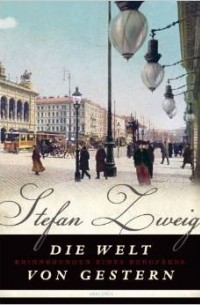Die Welt von Gestern: Erinnerungen eines Europäers
Stefan Zweig
14 июля 2009 г. 15:30
95
5
При прочтении этой книги возникает потрясающее чувство - ощущение, что ты сам вместе с Цвейгом ходишь на занятия в гимназию, просиживаешь часы в венском кафе, встречаешься с замечательными интересными людьми (ведь большинство упоминаемых лиц тебе знакомы) и переживаешь ужас мировых войн. Хотя нет...несмотря на исход жизни и выбор Цвейга, это не тот ужас Ремарка, Франк, Зеггерс и иже с ними...это именно описание событий именно этого человека, его глазами, его душой, тем не менее в мемуарах мало личного - лишь мимоходом упоминается о семье, о личных взаимоотношениях, это попытка донести до следующего поколения (как бы патетично это ни звучало) картину мира начала 20го века, вчерашнего мира. Казалось бы, прошло + - сто лет, меняется представление о должном поведении и о длине юбки, но…
6 февраля 2022 г. 18:08
71
5 Хорошее дополнение к учебнику Европейской истории
С вершины своих 60 лет Стефан Цвейг повествует, размышляет о судьбе Европы, некогда благополучного культурного, политического центра, который к 4о-м годам теряет свое величие и ставится местом небезопасным . Много воспоминани́й о деятелях культуры, искусства́, с которыми Цвейг встречался в Австрии, Германии, Британии; о них ,например, Рильке, написано много теплых слов. О воспитании, влиянии литературы на умы молодых людей, о физических нагрузках в образовательных учреждениях, о свободе творчества и личности - об этих и многих других вопросах говорит Стефан Цвейг в своем романе- воспоминании.
18 декабря 2021 г. 18:41
54
3 Limitations of Zweig
Although Zweig was born to a Jewish family, it should be noted that he was born to a middle-class family, who “grew rich, and then even rich”. But more importantly, his family and he himself have significantly contributed to the prosperity and development of Viennese culture. This is important, since, according to Zweig himself, people in Austria loved art and appreciated and respected anyone who was involved in art and culture, even if those people were Jewish. He states that this “fanatical love of art, in particular, the art of the theatre” was common to all classes of Vienna. Since Zweig himself wrote plays that were then performed on stages of the Burgtheater and were congratulated by the director of the theatre, we can state that he was a well-respected person. His stories about how he and his family, and friends, who probably were in the cultural circle, were treated in the pre-war times are relevant to only the Jews who promoted and nurtured the culture of Vienna. Therefore, it can be said that his outlook on pre-war Jewish life omits the points of view of those Jews who were not rich or did not contribute to the Viennese culture.
Secondly, his descriptions of pre-war Austria seem too idealistic and positively nostalgic, he even calls this era “the world of security”. Although this might be true, we can still claim that he probably was a bit biased and subjective in his descriptions. He wrote these memoirs slightly before committing suicide when he was in exile from Nazi Germany, and we can assume that he was extremely depressed and hopeless at that time. In his memoirs, he was comparing his current world, which was much worse than one could ever imagine, with the pre-war times where he did not experience any of those horrible things. Therefore, contrasting these two different worlds before and after the war could have resulted in him viewing the past times as heaven-like perfect times. In fact, he states that his parents lived in the world of security as a castle in the air, as if it was “a solid stone house. Not once did a storm or a cold draught invade their warm, comfortable presence”. He then compares the taxes during the pre-war times, laughing at how insignificant these increases were, that they seem like “a kind of little tip you gave the nation”. Therefore, every big problem and issue of the pre-war times might have seemed to him less serious and less horrid than they actually were.
Похожие книги
Вы можете посоветовать похожие книги по сюжету, жанру, стилю или настроению. Предложенные вами книги другие пользователи увидят здесь, в блоке «Похожие книги». Посоветовать книгу

















